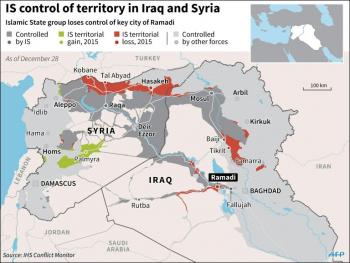Like this article? rabble is reader-supported journalism. Chip in to keep stories like these coming.
The lead, Western warmaking/regime-change countries intervening in northern Iraq and Syria held a strategy conference of their ministers of war in Paris on January 20. The meeting made waves in Canada because Ottawa was not invited to attend.
The meeting of ministers of the United States, Britain, Germany, France, Italy, Australia and the Netherlands discussed ongoing plans for intervention in Syria and Iraq. Canada is fully engaged in that intervention, more so than some of the other countries attending in Paris. For example, neither Italy or Germany have fighter aircraft engaged in bombings. But Canada was not invited to the party because Prime Minister Justin Trudeau made a promise during the national election campaign of October 19, 2015 that, if elected, his government would withdraw its six fighter-bomber jets from the U.S.-led warmaking alliance and instead focus on ground operations, including training of allied Iraqi and Kurdish forces.
The decision not to invite Canada was likely taken by U.S. Secretary of Defense (sic) Ashton Carter. Never mind that the new Trudeau government is not keeping its electoral promise or that, to the contrary, it has promised to step up its military presence in northern Iraq. No, for the U.S. government, any deviation from its lead in the imperialist war agenda is punishable by shunning.
The U.S. views the Canadian electoral promise as a weak-kneed sop. It cares not a whiff about the war-weary Canadian public, repelled by Canada's failed military intervention in Afghanistan. That intervention goes back to late 2001. 158 Canadian soldiers died in combat in Afghanistan. At least 59 of those who served have killed themselves upon their return while, shamefully, the previous Conservative government in Ottawa did all it could to reduce to a minimum disability payments to injured, returned soldiers.[1]
The U.S. snub is intended as a warning to the Trudeau government just in case any of its members are actually considering keeping their election promise. It needn't worry, there is no evidence that any are doing so. Also, importantly, the snub is serving as a rallying cry for pro-war ideologues in Canada who never liked the election promise in the first place and now want it definitively buried.
A January 18 op-ed in the Globe and Mail is exactly the kind of knee-jerk, pro-war backlash that the U.S. government wanted to foment. The writer, David Bercuson, is a well-known military academic in Canada. He directs his criticisms not at the United States government for snubbing its loyal ally but at the Trudeau government for giving the U.S. a reason to do so.
Bercuson wrote a commentary last month in the Globe saying that Prime Minister Trudeau was asking for trouble with his allies by making flaky election promises over war and intervention in the Middle East.
Columnist Thomas Walkom of the Toronto Star, Canada's largest circulation newspaper, provides a different view of the snub in a January 18 column. He calls it a "welcome snub". He says, "Trudeau's Liberals won power on a pledge to end Canada's combat mission in Iraq and Syria — in the air and on the ground. If they are serious about this, why should we expect the Americans to include Ottawa in their combat deliberations? More to the point, why should we want to be included?"
Ottawa is lucky to have carte blanche, more or less, in working out the subtleties of its desired intervention in Iraq and Syria. The two large opposition parties in Parliament support military intervention in the Middle East, differing only on how that should be done. Meanwhile, antiwar forces are weak and marginalized. Years of confusion over the regime change agenda of the imperialist countries in the in Africa and the Middle East (Mali, Libya, Egypt, Syria) combined now with utter disarray in the face of the anti-Russia drive of NATO have left antiwar forces marginalized.
Notes:
[1] For more on the ongoing tragedy of suicides by acting and former members of the Canadian Armed Forces, see this Jan 12, 2016 article in the Globe and Mail.
Further related news:
NATO allies miffed over Canada’s failure to meet defence spending commitment, by John Ivison, columnist, The National Post, Jan 21, 2016
... The pressure is piling on the government’s defence agenda from all sides. One particularly damning commentary doing the rounds points out that, according to estimated expenditures for 2015, only four NATO members are expected to spend less as a percentage of GDP than Canada and one of them is Luxembourg. The author of that piece was Roland Paris, Justin Trudeau’s new foreign policy adviser.
Like this article? rabble is reader-supported journalism. Chip in to keep stories like these coming.




Comments
Do
Don't